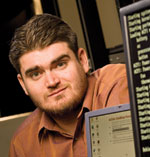Recent News
UNM Engineering team wins ASEE best paper for work on first-year engineering course
July 17, 2025
New director will enhance interdisciplinary engineering learning opportunities
July 2, 2025
Final SIRI cohort visits UNM campus
June 30, 2025
Perfetti receives ANS Landis Engineering Achievement Award
June 26, 2025
News Archives
Second Recipient of QForma Lectureship Award Challenges Students to Teach Him Something
April 7, 2011
 Jed Crandall, Assistant Professor of Computer Science, was recently selected as the second recipient of the QForma Lectureship Award. Qforma, the leading provider of advanced analytics and predictive modeling technologies for the health sciences industry, awards the $5,000 Lectureship to an extraordinarily promising junior faculty researcher in Computer Science at UNM.
Jed Crandall, Assistant Professor of Computer Science, was recently selected as the second recipient of the QForma Lectureship Award. Qforma, the leading provider of advanced analytics and predictive modeling technologies for the health sciences industry, awards the $5,000 Lectureship to an extraordinarily promising junior faculty researcher in Computer Science at UNM.
In a conversation with Jennifer Ingram, communications manager at QForma, Jed describes his teaching style as more “hands on” than the traditional lecture. “Instead, I try to do lab assignments and then challenge the students to teach me something. The best way for students to learn is through experience,” says Jed.
Jennifer’s interview with Jed is posted on QForma’s blog, and reposted below:http://qforma.com/blog/2011/03/conversation-with-jed-crandall/
Qforma Blog
Congratulations to Jed Crandall on becoming the second recipient of the Qforma Lectureship Award. Jed is an Assistant Professor in the Department of Computer Science at the University of New Mexico where he teaches and does research regarding privacy and security for personal computers. He landed at the University of New Mexico because of his love for the Southwest and the Department of Computer Science’s reputation. UNM’s Computer Science Department has “interesting and innovative research often crossing interdisciplinary boundaries,” says Jed. This semester Jed is teaching “Introduction to Cybersecurity”, reviewing traditional security ideas, network security, privacy, Internet censorship, and cryptography. Jed’s teaching style is more “hands on” than the traditional lecture. “Instead, I try to do lab assignments and then challenge the students to teach me something. The best way for students to learn is through experience,” says Jed.
One example of such a lab assignment is recounted below in Jed’s own words.
Last year, I gave the students an assignment that didn’t preclude ‘cheating’ in the instructions.
“The first part was to flip a coin 100 times and write down 0 for heads and 1 for tails. The second part was to find addresses for 190 random restaurants in Albuquerque and write down the last digit of the restaurant’s address. While I made it clear that the students wouldn’t be ‘bad people’ if they made the numbers up without doing all the hard work, the majority of the class actually did flip a coin and look up restaurants. I think they thought I was going to tell them what kind of coin they had and what kind of food they liked. What we did with the data instead was to use hypothesis testing and other statistical methods to find the ‘cheaters’ in the class. There were probably about half a dozen students who just sat down and wrote one hundred 0′s and 1′s as randomly as they could without actually flipping a coin and then did the same for the restaurant addresses, at random choosing 1 through 9, one hundred and ninety times. This was perfectly okay given how I specified the assignment. Using properties analogous to Benford’s law, we were able to find which data sets were made up. I’m really fascinated that data can be analyzed in that way.”
The Lectureship Award is an ongoing Qforma endeavor. “Qforma takes pride in sponsoring these talented individuals like Jed and his students at the University of New Mexico where they combine creativity and a passion for science to develop innovative solutions to real life challenges,” says Roger Jones, Chairman, COO and CSO of Qforma. This fits in with Jed’s future vision, “to run a program where UNM students can get involved in working on real problems for human rights organizations and other non-profits that are under [virtual] attack. I envision that students would gain a lot of practical skills that could be applied in any sector.”
